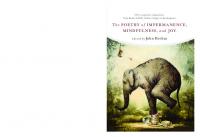Vipassana Meditation: Healing the Healer and The Experience of Impermanence 8174140093, 9788174140098
Ancient Secret Teachings.
119 24 302KB
English Pages 29 [6] Year 2023
Recommend Papers
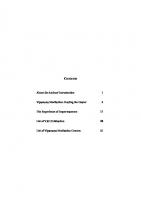
- Author / Uploaded
- Dr. Paul R. Fleischman
File loading please wait...
Citation preview
Vipassana Meditation: Healing the Healer
The Experience of Impermanence
Two Essays by Dr. Paul R. Fleischman
Vipassana Research Institute Dhamma Giri, Igatpuri
Contents
About the Author/ Introduction
1
Vipassana Meditation: Healing the Healer
3
The Experience of Impermanence
17
List of VRI Publication
28
List of Vipassana Meditation Centres
31
About The Author Dr. Paul Fleischman is the author of The Therapeutic Action of Vipassana and Why I Sit, two essays that were published under one cover by the Buddhist Publication Society of Kandy, Sri Lanka, in 1986 (Wheel Series No. 329, 330). He has also written The Healing Spirit: Explorations in Religion and Psychotherapy (Paragon House Publishers, New York, 1990 paperback ed.). He took his first Vipassana course under the guidance of Shri S.N. Goenka in 1974, and has conducted courses as an assistant teacher since 1987. He has taught Psychiatry and Religion at Yale University, and practises psychiatry in Amherst, Massachusetts. In San Francisco, in May 1993, Dr. Fleischman was honoured by the American Psychiatric Association as “an outstanding contributor in the field of psychiatry and religion.”
Introduction The first essay discusses the therapeutic role that meditation can have, its scientific basis, and its relevance to practitioners of healing professions. The second essay explains how Vipassana meditation can be understood through Western psychology, and why it leads the meditator away from narcissism to mature, social love.
Healing the Healer
3
Vipassana Meditation: Healing the Healer
Vipassana is an ancient meditation technique that is still practised today, and that can help healing professionals themselves. As a practising and teaching psychiatrist, I have been aided, through my practice of Vipassana, to deepen my autonomy and self knowledge at the same time that I have augmented my ability to be a professional anchor to others in the tumult of their lives. I have written about my experience and understanding of meditation in The Therapeutic Action of Vipassana and Why I Sit. Here I want to focus on the healers’ healing: why nutritionists, chiropractors, yoga teachers, family practitioner-physicians, psychologists and psychiatrists of my acquaintance have all been able to grow in their personal and professional lives while practising Vipassana. Vipassana touches the common ground of healing. It is acceptable and relevant to healers of diverse disciplines because it is free of dogma, experientially based, and focused on human suffering and relief. It contains the healing element from which the various molecules of our helping professions are built. What, after all, must we do and be to heal ourselves, and to have energy to heal others? I believe the answer to this question is both obvious and universally acknowledged among healers of differing theoretical orientations. We must see deeply into ourselves, our personal fears and prejudices and conventions and opinions, so that we may stand thoughtfully, clear-sightedly on reality. We must be able to differentiate the accidents of our birth, culture, and particular conditionings from the universal and the timeless truths. We must live balanced, full lives, that sweep up the breadth and depth of what is potential in us as human beings; yet at the same
Acharaya Shri S. N. Goenka & Smt. Illaichidevi Goenka
Sri Satyanarayanji Goenka was born in Mandalay, Myanmar in 1924. Although he topped the list of all successful candidates in the whole of Myanmar in the tenth class he could not continue his studies further up many commercial and industrial institutions and earned fabulous wealth. He also established many social and cultural centres. Because of tension he became a victim of migraine, which could not be cured by doctors of Myanmar and of other countries in the world. Then some one suggested him to take a course of Vipassana. Vipassana has done well He learned Vipassana from Sayagyi U Ba Khin in 1955. Sitting at the feet of his teacher he practiced it for fourteen years He also studied the words of the Buddha during this period. He came to India in 1969 and
Up till now 165 centres have been established all over the world. New centres also are coming up. At these centres 1200 trained teachers teach vipassana in 55 languages of the world. Not only ten- day courses are conducted at these centres but also at some centres 20-day, 30-day, 45-day and 60-day courses are conducted. All courses are free of charge. The expenses on food and accommodation etc are met by the its benevolent nature vipassana courses is held not only for the inmates of jails and school children in the world but also for police personnels,
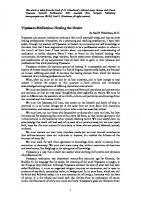
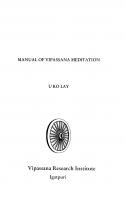

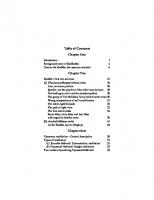

![Karma and Chaos: New and Collected Essays on Vipassana Meditation [1 ed.]
9781928706694](https://ebin.pub/img/200x200/karma-and-chaos-new-and-collected-essays-on-vipassana-meditation-1nbsped-9781928706694.jpg)

